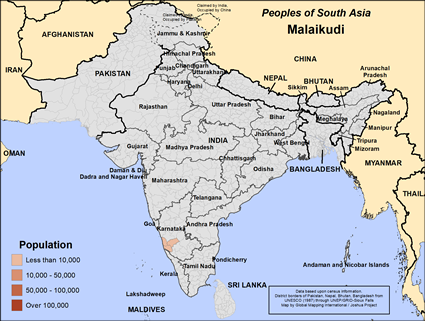The Mailakudi people live in India, primarily in the state of Karnataka. Their history is deeply connected to the land, where they have traditionally engaged in agriculture and forest-based activities. The Mailakudi have long maintained a close relationship with their environment, relying on the land and natural resources for their livelihood. Over time, they have adapted to various socio-political changes while preserving their distinct identity within the region.
The Mailakudi people primarily engage in agriculture, cultivating crops such as rice, millet and various vegetables. Many also depend on the collection of forest products, including honey, medicinal herbs and timber which they use for both sustenance and trade. Villages are typically small and located in rural areas, with homes constructed from locally sourced materials like mud, thatch, and bamboo. Social life revolves around family and community, with a strong emphasis on cooperation in agricultural work and participation in communal events. Education access has improved, but many Mailakudi children still face challenges related to economic constraints and limited educational facilities, particularly in remote areas. Healthcare services are available, though often limited, leading to a reliance on traditional medicine and local healers.
The Mailakudi people predominantly practice Hinduism, which plays a central role in their daily lives and spiritual practices. They worship a variety of Hindu deities, with special reverence for gods and goddesses associated with agriculture, fertility and protection.
Rituals and ceremonies mark significant life events and agricultural cycles, reflecting their deep connection to the land and its rhythms. Temples and local shrines serve as important centers for religious activities, and festivals such as Pongal, Diwali, and local harvest festivals are celebrated with community participation.
The Mailakudi people face challenges related to economic development, education, and healthcare. Many continue to rely on subsistence farming and forest resources, with limited opportunities for alternative income sources. Educational facilities, while improving, are often inadequate in rural areas, leading to low literacy rates and limited access to higher education. Healthcare services, though present, are often insufficient in remote villages, resulting in poor health outcomes and a reliance on traditional practices that may not always meet modern health needs. Infrastructure improvements, such as better roads, sanitation and access to clean water are essential for enhancing their quality of life. Initiatives focused on sustainable development, education, and healthcare are crucial for the long-term progress of the Mailakudi people.
Pray that the hearing of the word will result in leaders from the Mailakudi people confessing their sins and worshiping the true Lord. Pray that the knowledge of the Lord will result in a movement to Christ that will spread far and wide throughout Karnataka. Pray for them to access the JESUS Film.
Scripture Prayers for the Malaikudi in India.
Tamil Nadu Cultural Studies. (2023). Ethnographic Overview of the Mailakudi People. Retrieved from tamilnaduculturalstudies.org
UNDP India. (2023). Development Needs of Rural Communities in Tamil Nadu. Retrieved from in.undp.org
| Profile Source: Joshua Project |











